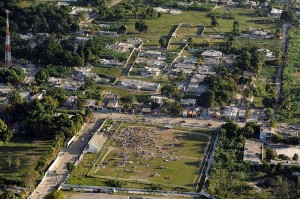
Orchestras, Soloist Turn Talents to Haitian Relief
An overhead view of destruction in Port-au-Prince. There has been a tremendous response of physical aid and monetary assistance to the tragedy in Haiti, and the musical community has been an important part of it.
The national Hope for Haiti telethon featured a good deal of music during its broadcast, and tonight, the Cleveland Orchestra and New World Symphony will join in a concert called Musicians for Haiti. Conductors Franz Welser-Möst and Teddy Abrams will lead an elegaic program that includes the Barber Adagio for Strings and the Nimrod variation from Elgar’s Enigma Variations, as well as Tchaikovsky’s Fourth Symphony.
Proceeds from the Lincoln Theatre concert (tickets are $35) will benefit a group called Partners in Health, a Boston-based organization that has been working in Haiti for more than 20 years, and employs 11,000 people around the world in the communities it serves.
And up in the Palm Beach County city of Wellington this weekend, the violinist Mark O’Connor, celebrated for his crossover aesthetic, is playing a solo recital that has been transformed into a Haitian relief benefit. Net ticket, concession and parking revenue is being donated to the Haitian Relief Fund of the Southeast Diocese of the Episcopal Church.
All of this is admirable, and welcome, and timely, and no doubt audiences will be happy to know their money is going to such an important cause.
It’s worth noting in this connection that we can probably expect some special music to be written about this earthquake, and that reminds me that there is at least one major example from the past in which a calamitous earthquake was commemorated in music.
A drawing of the chaos that followed the Lisbon quake. That was the Lisbon earthquake of 1755, a catastrophic event that killed about 100,000 people in the Portuguese capital and destroyed about 85 percent of the city (so much so that King Joseph I, who had been away from Lisbon that morning, insisted on living in a series of tents thereafter). The quake was followed by a tsunami and fires, and Portugal lost much of its unique cultural patrimony for good.
The quake is usually credited with inaugurating the science of seismology, it having excited so much intellectual interest. And in the German states the following year, composer Georg Philipp Telemann wrote an entire cantata, Die Donner-Ode (or Ode of Thunder), to commemorate the Lisbon tragedy. Here’s a piece of it:
The music tonight will be a wonderful way to remind all of us of how we’re all bound together in a human web, and that aside from the real help we can give, we can draw on this tragedy perhaps to keep our common humanity more in mind during our daily lives.
And then sometimes there are no sounds that we can make. Last week at Lynn University in Boca Raton, where two professors and four students are still lost in the wreckage of Port-au-Prince, the music conservatory opened each of its New Music Festival concerts with a moment of silence for the missing members of their community.
That, too, is an effective commemoration, and both of these do honor to the people of Haiti and their suffering nation.
